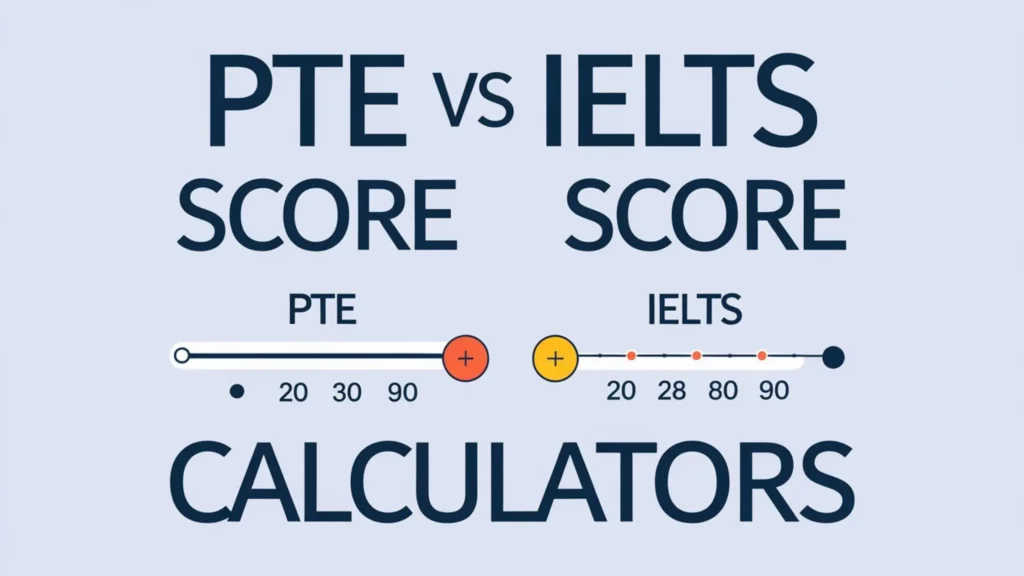Planning to study abroad? Then you’ve probably come across the terms IELTS and PTE more than once. These two standardized English proficiency tests are gateways to universities in English-speaking countries. Schools, immigration departments, and even employers use them to evaluate your language skills.
Whether you’re aiming for a top university in the US, UK, Australia, or Canada, choosing the right English proficiency test can make a huge difference. In this guide, we break down IELTS vs. PTE in detail to help you decide which suits your goals, learning style, and visa requirements.
Table of Contents
Understanding IELTS

The International English Language Testing System (IELTS) is one of the most well-established English tests in the world. It’s been around since 1989 and is trusted by over 11,000 organizations globally.
IELTS Test Format
There are four primary sections to the IELTS exam:
| Section | Time | Description |
|---|---|---|
| Listening | 30 mins | 4 recordings with increasing difficulty |
| Reading | 60 mins | 3 long texts from books, journals, newspapers |
| Writing | 60 mins | 2 tasks: essay writing and a report/letter |
| Speaking | 11-14 mins | Face-to-face interview with an examiner |
You can take the test in Academic or General Training format depending on your purpose (study vs. migration).
IELTS Scoring System
Each section is scored from 0 to 9 bands, and the average of the four gives your overall band score. A score of 6.5 to 7.5 is usually required for top-tier universities.
Countries Accepting IELTS
IELTS is widely accepted in:
- United Kingdom
- Australia
- Canada
- New Zealand
- USA (more than 3,400 institutions)
- Ireland
Even non-English-speaking countries that offer English-taught programs accept IELTS.
Understanding PTE

Pearson Test of English (PTE) is a newer, computer-based English test introduced in 2009. It’s known for its speed, automated scoring, and flexibility.
PTE Test Format
| Section | Time | Description |
|---|---|---|
| Speaking & Writing | 54–67 mins | Integrated tasks such as reading aloud, essay writing |
| Reading | 29–30 mins | Fill-in-the-blanks, reordering paragraphs |
| Listening | 30–43 mins | Summarizing, multiple choice, dictation |
PTE Academic is most commonly taken for university applications.
PTE Scoring System
PTE scores range from 10 to 90, with real-time AI marking. A score between 58 and 73 is considered competitive for most universities.
Countries Accepting PTE
PTE is accepted in:
- Australia (accepted for visa and universities)
- United Kingdom
- New Zealand
- Canada (for select institutions)
- USA (most institutions accept it now)
It’s also recognized by several government immigration departments.
IELTS vs. PTE: Key Differences
Format & Structure
- IELTS offers both computer-based and paper-based options.
- PTE is completely computer-based.
- IELTS speaking is done face-to-face, whereas PTE speaking is done via a microphone and recorded.
Scoring & Accuracy
- PTE scoring is automated, which can reduce human bias.
- IELTS scoring involves human examiners, especially for writing and speaking, offering more nuanced feedback.
Test Duration & Scheduling
- IELTS takes about 2 hours and 45 minutes, and speaking may be scheduled separately.
- PTE takes around 3 hours and is completed in one sitting.
- PTE results are delivered in 48 hours, while IELTS may take 3–5 days (computer) or 13 days (paper).
Which Test is Easier? A Student Perspective
This is one of the most common questions, but the answer depends on your comfort level.
- If you’re better at typing and prefer no human interaction during exams, PTE might be easier.
- If you’re confident in face-to-face communication and enjoy more traditional formats, IELTS could suit you better.
Many students say PTE feels less stressful due to the computer interface and faster results.
PTE vs IELTS Score Calculators

When planning to study or migrate abroad, understanding your language proficiency test scores is crucial. Many students often compare PTE and IELTS scores to determine their equivalence. That’s where PTE vs IELTS score calculators come in handy. These tools help test-takers quickly convert and compare their scores between the two exams, ensuring accurate insights for university or visa requirements. PTE vs IELTS score calculators are especially useful for students aiming to make informed decisions based on their performance and eligibility. By using trusted PTE vs IELTS score calculators, you can avoid confusion and get a clear picture of your standing.
Why Use PTE vs IELTS Score Calculators?
- Easily compare your PTE and IELTS scores without manual calculation.
- Helps determine which test better suits your migration or study goals.
- Ideal for students applying to institutions that accept both test formats.
- Saves time and ensures accuracy in score conversion.
- Most PTE vs IELTS score calculators are free and accessible online.
Whether you’re switching between exams or just want clarity, PTE vs IELTS score calculators are your go-to tools for fast, reliable score comparisons.
PTE Score Compare to IELTS
Understanding how your PTE score compare to IELTS is essential when planning to study or migrate abroad. Both PTE and IELTS are widely accepted English proficiency tests, but their scoring systems differ. Many students and professionals often search for accurate ways to interpret how their PTE score compare to IELTS to meet university or visa requirements. Knowing how your PTE score compare to IELTS can help you choose the right exam and understand your performance level across both formats. With official score charts and online tools available, it’s easier than ever to check how your PTE score compare to IELTS in terms of reading, writing, listening, and speaking bands.
Key Points to Know: PTE Score Compare to IELTS
- The PTE score compare to IELTS charts is based on official concordance data.
- A PTE score of 65 is roughly equivalent to an IELTS band 7.
- Knowing how your PTE score compare to IELTS helps in selecting the exam preferred by your destination country.
- Universities often publish guidelines on how PTE score compare to IELTS for admission purposes.
- Accurate PTE score compare to IELTS conversion ensures no misinterpretation of your language abilities.
By understanding how your PTE score compare to IELTS, you can make smarter decisions for your academic or migration journey.
Which Test Do Universities Prefer?
Most international universities accept both IELTS and PTE, but the recognition of IELTS is more widespread, especially in Canada and the UK.
| Country | Preference |
|---|---|
| UK | IELTS preferred |
| Australia | Both equally accepted |
| Canada | IELTS more accepted |
| USA | Increasing PTE recognition |
Always check your target university’s admission page before deciding.
Cost Comparison: IELTS vs. PTE
Here’s a rough cost comparison in USD (as of 2025):
| Test | Average Cost |
|---|---|
| IELTS | $245 – $255 |
| PTE | $200 – $220 |
Prices vary by country and may include taxes and re-take fees.
Availability and Test Centers
- More than 140 nations have more than 1,600 IELTS test locations.
- PTE has 400+ test centers in 117 countries, but is expanding rapidly.
Both offer multiple test dates monthly, but PTE often has more flexible scheduling.
Computer-Based vs. Paper-Based Experience
The delivery format can be a deciding factor:
- Paper-based IELTS is ideal if you prefer handwriting and traditional exam styles.
- PTE’s computer-based exam offers prompt feedback, making it perfect for tech-savvy students.
For test takers with handwriting challenges, PTE may be a better option.
Tips for Choosing the Right Test for You
- Check your university’s accepted tests
- Consider your comfort level with technology
- Reflect on whether you’re better at speaking with people or in digital-only interactions
- Evaluate how fast you need the results
- Look at the test dates and location availability
Success Stories: Students Who Took IELTS or PTE
Amrita from India took IELTS and scored an 8.0 band. She got into the University of Melbourne and praised IELTS for its familiar format and in-person speaking test.
James from Nigeria opted for PTE due to the quick result turnaround. He scored 79 and secured admission at the University of Auckland. He loved the computer-based format and minimal waiting time.
These stories prove there’s no one-size-fits-all—your choice depends on your strengths and situation.
FAQs
1. Is the PTE or IELTS the more well recognized test?
IELTS is more widely accepted worldwide, especially in the UK, Canada, and Ireland. In Australia and New Zealand, PTE is becoming more and more common.
2. Is PTE easier than IELTS?
For some students, yes. PTE’s computer-based format and integrated questions are more intuitive for tech-savvy learners. But it depends on your individual strengths.
3. IELTS or PTE: Which is Better?
Both IELTS and PTE Academic are widely accepted English proficiency tests, but which one is “better” depends on your specific needs:
IELTS is more widely accepted and acknowledged by all immigration authorities worldwide.
PTE is fully computer-based with faster results (typically within 2 days)
Because PTE is automated, some test-takers may find it easier.
IELTS offers both paper-based and computer-delivered options
4. Is PTE 65 Equal to IELTS 7?
Yes, according to official conversion charts:
PTE score of 65 equals IELTS 7.0 (for all bands)
This equivalence is accepted by Australian immigration (DHA) and most educational institutions
5. Which Countries Prefer PTE?
PTE Academic is preferred or widely accepted in:
Australia (all universities and immigration)
New Zealand (for visas and education)
UK (for certain visa types and the majority of colleges)
Canada (for Student Direct Stream)
USA (accepted by many universities)
6. Can I use PTE for Canadian student visas?
Yes, but only select institutions accept PTE for student visas. IELTS is more broadly accepted in Canada.
7. Can I Go to Australia Without IELTS or PTE?
Yes, there are some alternatives:
Other accepted tests: TOEFL iBT or Cambridge English (CAE)
English-speaking country passport holders: From UK, USA, Canada, Ireland, NZ
Prior English education: If you’ve completed certain studies in English
Partner visa applicants: May not need test if sponsor is citizen/permanent resident
Some employer-sponsored visas: May have different requirements
8. Can I take the test from home?
PTE offers PTE Academic Online, and IELTS offers IELTS Indicator. However, not all institutions accept online versions for official purposes.
9. How many may I repeat the exams?
There’s no limit on how many times you can retake IELTS or PTE. Just ensure enough time between attempts to improve your skills.
Conclusion: IELTS vs. PTE – Your Best Bet for Studying Abroad
Choosing between IELTS vs. PTE depends on your preferences, academic goals, and the specific requirements of your desired institutions. Both tests are credible, widely accepted, and effective at measuring your English skills.
Go with IELTS if you prefer structured, human-interacted testing and broader acceptance. Choose PTE if you like fast results, a digital-first experience, and flexibility.
Whatever you choose, prepare thoroughly, practice often, and give it your best shot—your dream of studying abroad is just a test away.
Also Read
IELTS Exam 2024-25: Complete Guide to Test Format, Syllabus, Preparation Tips, and More









